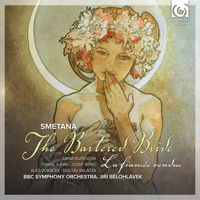
Mostly Excellent
Smetana's
'The Bartered Bride' -
heard by
STEPHEN FRANCIS VASTA'... a fine performance ...'
|

|
You'd be forgiven if you're not sure exactly what's on offer here. The front of harmonia mundi's 'digipak' proudly proclaims The Bartered Bride, which may lead you to expect an English-language performance. (There's already one such in the catalogue, from Chandos; and the piece first gained international currency in German translation, as Die verkaufte Braut.) Below that, in a slightly smaller font, is the French version of the title, La fiancée vendue, presumably a nod to the record company's local customer base. The original Czech title, Prodaná nevěsta, isn't mentioned anywhere at all!
But, while the orchestra and chorus are British, the soloists and conductor are indisputably Czech. This is Prodaná nevěsta that we're hearing, and a fine performance of it at that.
Listen -- Smetana: Overture (The Bartered Bride)
(CD1 track 1, 5:30-6:34) © 2012 harmonia mundi sa :
Jiří Bělohlávek directs with the expected authority and flair -- he's particularly sensitive to the melancholy that infuses some of the dance rhythms -- though the London-based forces don't immediately take to 'speaking Czech' musically. The famous overture, for example, gives the BBC Symphony players no real problem, but the strings don't capture the hearty lilt with which the best Czech (and international!) performances infuse the running lines, so the effect is merely skittery. Similarly, the BBC Singers are well disciplined, but sound rather diffuse in the opening chorus, lacking a real Italianate core. But both ensembles improve as the performance proceeds. The music of the overture comes off much better when it returns in the second finale, and the Dance of the Comedians is zippy; the chorus is rousing in the tutti finale.
Listen -- Smetana: Dobrá věc se podařila (The Bartered Bride Act III)
(CD2 track 24, 1:23-2:07) © 2012 harmonia mundi sa :
It helps that Bělohlávek fields a cast of mostly first-rate singers, and even the single exception, Jozef Benci as the marriage broker Kecal, isn't a write-off. His infectious, pattery delivery underlines the role's grounding in opera buffa -- though its style is vigorous and energetic where its Italian counterparts are, ideally, playful -- and he knows how to play his low extension for comic effect. But Benci's higher sustained notes suffer the wobble that seems to afflict exponents of this role in particular.
Vocal pride of place goes to Dana Burešová, whose warm, lustrous soprano limns an emotionally rich Mařenka. At first, her phrasing sounds too evenly stressed, but that's not really the problem (the even stress pattern, after all, inheres in the language) -- she's also oversinging slightly. As she relaxes, however, her singing becomes expressive and more beautiful. She can't quite dominate the full ensemble when she's singing over it, but this is rarely an issue here.
Aleš Voraček also makes an unexpectedly positive impression as the stuttering Vašek, a difficult role to bring off. Instead of playing the stammering syllables of the aria for cheap, inconsiderate laughs, Voraček actually sings them with clear, pillowy tones, incorporating them into the fuller characterization of a nervous, unworldly boy. The duet with Burešová's beguiling Mařenka is actually quite touching.
Listen -- Smetana: Známť já jednu dívčinu (The Bartered Bride Act II)
(CD1 track 17, 0:36-2:04) © 2012 harmonia mundi sa :
There were times I wished Voraček and Tomás Juhás could have switched parts. Juhás has the sort of ringing sound that people like in a tenor lead, but his way of 'collecting' Jeník's topmost notes produces constriction. Listen to the tradeoff of high B-flats in the first duet with Mařenka: Burešová blooms, but Juhás gets throaty. In the duet with Kecal, the tenor pulls conspicuously ahead when recalling his faraway home. He does, however, propel the Act Two drinking song with soaring tones.
The parents are all good, though the sextet is less eloquent than it has been elsewhere -- notably on Kempe's German-language recording (EMI) -- because of uncertain tuning among the upper parts. (At least the Háta, Lucie Hilscherová, is gratifyingly firm.) It's Burešová's generous, anguished voicing of the following aria that makes the scene a success.
Listen -- Smetana: Ó, jaký žal (The Bartered Bride Act III)
(CD2 track 17, 0:00-1:13) © 2012 harmonia mundi sa :
Even the circus personnel are strongly profiled. Kateřina Kněžiková's bright, shiny voice, a nice improvement on the usual pallid soubrette, brings plenty of presence to Esmeralda. And Jaroslav Březina's sings the Ringmaster in clear, firm tones, occasionally suggesting an overblown take on Slavic chant!
The production is mostly excellent, with a few cavils. The bass is a bit boomy, so the tympani tend to obscure the livelier textures. The approaching band in Act Three, Scene Two, is convincing, though the effect is clearly electronic. Finally, why on earth did harmonia mundi choose to include a 'singing' English translation in the booklet? My knowledge of Czech is spotty, but sufficient to tell me that what's printed is an intermittent and approximate rendering of the original. Adding insult to injury, the libretto misplaces the start of track 5 of the first disc.
Copyright © 5 June 2013
Stephen Francis Vasta,
New York, USA

|

